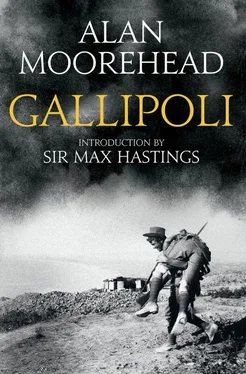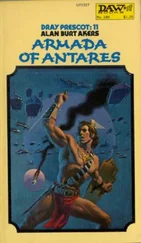This in itself was something of an achievement, for the force that was now assembling itself in Egypt was a very mixed bag indeed. There were the French, a splendid sight on the parade ground, their officers in black and gold, the men in blue breeches and red coats. There were Zouaves and Foreign Legionaries from Africa, Sikhs and Gurkhas from India, and the labour battalions of Levantine Jews and Greeks. There were the sailors of the British and French Navies. There were the Scottish, English and Irish troops. And finally there were the New Zealanders and the Australians.
These last were an unknown quantity. They were all volunteers, they were paid more money than any of the other soldiers, and they exhibited a spirit which was quite unlike anything which had been seen on a European battlefield before. A strange change had overtaken this transplanted British blood. Barely a hundred years before their ancestors had gone out to the other side of the world from the depressed areas of the United Kingdom, many of them dark, small, hungry men. Their sons who had now returned to fight in their country’s first foreign war had grown six inches in height, their faces were thin and leathery, their limbs immensely lithe and strong. Their voices too had developed a harsh cockney accent of their own, and their command of the more elementary oaths and blasphemies, even judged by the most liberal army standards, was appalling. Such military forms as the salute did not come very easily to these men, especially in the presence of British officers, whom they regarded as effete, and their own officers at times appeared to have very little control over them. Each evening in thousands the Australians and New Zealanders came riding into Cairo from their camp near the pyramids for a few hours’ spree in the less respectable streets, riding on the tops of trams, urging their hired cabs and donkeys along the road — and the city shuddered a little.
This independent spirit was a promising thing in its own way, but for Birdwood, the British officer who was put in command of the Anzac [9] ANZAC: Australian and New Zealand Army Corps. The word bears an unfortunate resemblance to the Turkish ‘ANSAC’ which means ‘almost’.
corps, there was a problem here which could not be easily solved. The men were nearly all civilians, and who could say how they would behave when they came under enemy fire for the first time? A period of intensive training began, but there was not much time.
Indeed, there was very little time for any of the matters which Hamilton had to attend to if he was to honour his undertaking that the attack would be launched by the middle of April. He did not reach Alexandria until the afternoon of March 26, and this meant he had barely three weeks in hand. The job that lay before the General was, in effect, nothing less than the setting up of the largest amphibious operation in the whole history of warfare. No similar exploit in the past bore any real comparison: in 1588 the Spanish Armada never did succeed in landing its men on England; neither Napoleon in Egypt in 1799 nor the British and the French in the Crimea in 1854 had had to face such entrenched positions as Liman von Sanders was now establishing at Gallipoli. In fact the only operation that could be compared with this lay thirty years ahead on the beaches of Normandy in the second world war; and the planning of the Normandy landing was to take not three weeks but nearly two years.
Hamilton’s mind went back to classical times. ‘The landing of an army upon the theatre of operations I have described,’ he wrote in one of his despatches, ‘—a theatre strongly garrisoned throughout and prepared for any such attempt — involved difficulties for which no precedent was forthcoming in military history, except possibly in the sinister legends of Xerxes.’
There were some 75,000 men at the General’s disposal: 30,000 Australians and New Zealanders divided into two divisions, the 29th British Division of 17,000 men, one French division of 16,000, and the Royal Naval Division of 10,000. All these forces, together with 1,600 horses, donkeys and mules and 300 vehicles, had to be so assembled on board the ships that they would be able to land together on the enemy coast under the direct fire of the Turkish guns.
It is a matter of some surprise that the expedition ever got to sea at all. On March 26 Hamilton’s administrative staff had still not arrived from England (it did not get to Alexandria until April 11), many of the soldiers were still at sea, no accurate maps existed, there was no reliable information about the enemy, no plan had been made, and no one had yet decided where the Army was to be put ashore.
The simplest of questions were unanswered. Was there water on the shore or not? What roads existed? What casualties were to be expected and how were the wounded men to be got off to the hospital ships? Were they to fight in trenches or in the open, and what sort of weapons were required? What was the depth of water off the beaches and what sort of boats were needed to get the men, the guns and the stores ashore? Would the Turks resist or would they break as they had done at Sarikamish; and if so how were the Allies to pursue them without transport or supplies?
It was perhaps the very confusion of this situation which made it possible for the staff to get things done. Since no one could really calculate what the difficulties were going to be it was simply a matter of taking the material that came to hand, and of hoping for the best. A period of hectic improvisation began. Men were sent into the bazaars of Alexandria and Cairo to buy skins, oildrums, kerosene tins — anything that would hold water. Others bought tugs and lighters on the docks; others again rounded up donkeys and their native drivers and put them into the Army. There were no periscopes (for trench fighting), no hand grenades and trench-mortars; ordinance workshops set to work to design and make them. In the absence of maps staff officers scoured the shops for guide-books.
On the Alexandria docks lamps were set up so that the work of unloading and repacking the ships could go on all night, and soon the harbour was filled with vessels of every kind from Thames tugboats to requisitioned liners. There was a shortage of almost everything — of guns, of ammunition, of aircraft and of men — and Hamilton sent off a series of messages to Kitchener asking for reinforcements. He had found a brigade of Gurkhas in the Egyptian garrison — could he have those? Where were his reserves of artillery and shells? These requests were met either with terse refusals or no reply at all. Hamilton felt that he was hardly in a position to press the point; Kitchener had been known to be ruthless with subordinates who nagged him, and once he had even taken troops away from an officer who had asked for reinforcements. Then too Hamilton remembered that he had promised Kitchener before he left that he would not embarrass him with requests of this kind. Churchill of course would have helped, but the General had deliberately cut himself off from the First Lord. De Robeck also was chary about asking for too much since his messages were bound to go directly to Fisher in the Admiralty.
‘Even more than in the Fleet,’ Hamilton wrote, ‘I find in the Air Service the profound conviction that, if they could only get into direct touch with Winston Churchill, all would be well. Their faith in the First Lord is, in every sense, touching . But they can’t get the contact and they are thoroughly imbued with the idea that the Sea Lords are at the best half-hearted; at the worst, actively antagonistic to us and the whole of our enterprise.’
Hamilton’s own divisional commanders were very far from being enthusiastic. Before drawing up his plans for the invasion the General asked them for their views, and he received a most discouraging series of replies. Hunter-Weston, the commander of the 29th Division, thought that the difficulties were so great that the expedition ought to be abandoned altogether. Paris, the commander of the Naval Division, wrote, ‘To land would be difficult enough if surprise were possible but hazardous in the extreme under present conditions.’ Birdwood changed his ground; he no longer wanted to go ashore at the tip of the peninsula but at Bulair or somewhere in the neighbourhood of Troy. The French too were all for Asia. Even the Egyptian sultan at a ceremonial luncheon at the Abdin Palace in Cairo offered his opinion. The Turkish forts at the Dardanelles, he assured Hamilton, were absolutely impregnable.
Читать дальше












